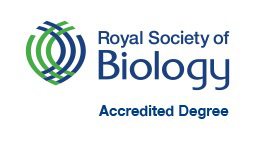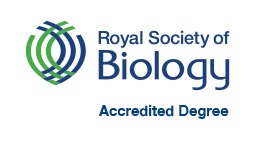Microbiology (with integrated year in industry) Code C502 Attend an Open Day Attend an Open Day Clearing places available – 0800 121 40 80
Apply NowYou are viewing this course for September start 2024
Key Facts
C502-
UCAS Tariff
120 - 104
-
Course duration
4 years
Further details on entry requirements
Apply NowKick start your career and enhance your job prospects with our BSc Microbiology degree with an integrated year in industry here at Aberystwyth University. This course is designed to give you a head start in an increasingly competitive job market. The year that you spend away from Campus working in industry will give you the additional insight, knowledge and experience that are highly valued by employers.
The BSc Microbiology degree at Aberystwyth University introduces you to a fascinating world of bacteria, fungi, and viruses, and their role in infectious diseases in humans, animals and plants. Microorganisms, also known as microbes, are organisms that are too small to be visible to the naked eye and they are essential to our understanding of life on Earth. You will learn how these microorganisms have an influence on all aspects of our lives, from the air we breathe to the food we eat. On our BSc Microbiology degree course you will develop the scientific and analytical skills that are in high demand in a broad range of professions, and if you want to play a part in solving big global problems such as climate change, pollution and antibiotic resistance, a degree in Microbiology is a good place to start.
Course Overview
Modules September start - 2024
Please note: The modules listed below are those currently intended for delivery during the next academic year and may be subject to change. They are included here to give an indication of how the course is structured.
| Module Name | Module Code | Credit Value |
|---|---|---|
| Cell Biology * | BR17520 | 20 |
| Ecology and Conservation * | BR19320 | 20 |
| Genetics, Evolution and Diversity | BR17120 | 20 |
| Microbial and Plant Diversity * | BR19920 | 20 |
| Skills for Biologists * | BR16820 | 20 |
Options
| Module Name | Module Code | Credit Value |
|---|---|---|
| Biological chemistry | BR17320 | 20 |
| Disease Diagnosis and Control | BR15420 | 20 |
| Module Name | Module Code | Credit Value |
|---|---|---|
| Environmental Microbiology and Monitoring * | BR26020 | 20 |
| One Health Microbiology | BR26520 | 20 |
| Practical and Professional Skills in Microbiology | BR24720 | 20 |
| Research Methods * | BR27520 | 20 |
Options
| Module Name | Module Code | Credit Value |
|---|---|---|
| Applied Molecular Biology and Bioinformatics | BR20620 | 20 |
| Cell and Cancer Biology | BR25920 | 20 |
| Immunology | BR22220 | 20 |
| Proteins and Enzymes | BR26620 | 20 |
| Module Name | Module Code | Credit Value |
|---|---|---|
| Integrated Year in Industry | BRS0060 | 60 |
| Module Name | Module Code | Credit Value |
|---|---|---|
| Microbial Pathogenesis | BR33720 | 20 |
| Biotechnology | BR35520 | 20 |
| Research Project * | BR36440 | 40 |
Options
| Module Name | Module Code | Credit Value |
|---|---|---|
| Bioinformatics and Functional Genomics | BR37120 | 20 |
| Molecular Pharmacology | BR36120 | 20 |
| Terrestrial Ecology Fieldcourse | BR36620 | 20 |
| Veterinary Infectious Diseases | BR34120 | 20 |
* Also available partially or entirely through the medium of Welsh
Careers
Teaching & Learning
Typical Entry Requirements
UCAS Tariff 120 - 104
A Levels BBB-BCC with B in Biology
GCSE requirements (minimum grade C/4):
English or Welsh, Science and Mathematics
BTEC National Diploma:
DDD-DDM in a specified subject
International Baccalaureate:
30-28 with 5 points in Biology at Higher Level
European Baccalaureate:
75%-65% overall with 7 in Biology
English Language Requirements:
See our Undergraduate English Language Requirements for this course. Pre-sessional English Programmes are also available for students who do not meet our English Language Requirements.
Country Specific Entry Requirements:
International students whose qualification is not listed on this page, can check our Country Specific Entry Requirements for further information.
The University welcomes undergraduate applications from students studying the Access to Higher Education Diploma or T-level qualifications, provided that relevant subject content and learning outcomes are met. We are not able to accept Access to Higher Education Diplomas or T-levels as a general qualification for every undergraduate degree course.
Our inclusive admissions policy values breadth as well as depth of study. Applicants are selected on their own individual merits and offers can vary. If you would like to check the eligibility of your qualifications before submitting an application, please contact the Undergraduate Admissions Office for advice and guidance.


